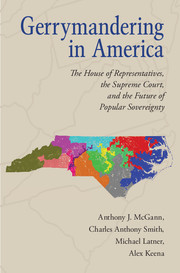 Gerrymandering in America
Gerrymandering in America Book contents
- Frontmatter
- Contents
- 1 The Unnoticed Revolution
- 2 The Jurisprudence of Districting
- 3 Measuring Partisan Bias
- 4 Geographic Explanations for Partisan Bias
- 5 Political Explanations of Partisan Bias
- 6 Constitutional Implications of Vieth: The Revenge of the Anti-Federalists
- 7 Answering Justice Scalia's Challenge to Equality: Does Equal
- 8 Conclusion: Vieth, Majority Rule, and One Person, One Vote
- Bibliography
- Index
1 - The Unnoticed Revolution
Published online by Cambridge University Press: 05 March 2016
- Frontmatter
- Contents
- 1 The Unnoticed Revolution
- 2 The Jurisprudence of Districting
- 3 Measuring Partisan Bias
- 4 Geographic Explanations for Partisan Bias
- 5 Political Explanations of Partisan Bias
- 6 Constitutional Implications of Vieth: The Revenge of the Anti-Federalists
- 7 Answering Justice Scalia's Challenge to Equality: Does Equal
- 8 Conclusion: Vieth, Majority Rule, and One Person, One Vote
- Bibliography
- Index
Summary
Shortly after the 2012 elections, when all the votes had been collated, it was noticed that the Republicans had won 234 seats out of 435 in the House of Representatives, even though the Democrats had won a slight majority of the vote (50.6%). This in itself was not particularly remarkable. After all, the Republicans had won a House majority in 1952 and 1994 without winning a majority of the vote. These proved to be one-off events. However, we shall argue, what happened in 2012 was different. The result in 2012 was the result of systematic bias produced by the new districts adopted after the 2010 Census.
Furthermore, eight years earlier the Supreme Court decision in the case Vieth v. Jubelirer (2004) made challenging a districting plan on grounds of partisan gerrymandering practically impossible. The combination of the Supreme Court effectively permitting partisan gerrymandering and the willingness of many state governments to draw districts for maximum partisan advantage has profound consequences. It will effectively determine control of the House of Representatives for the next decade; it provides a loophole for the egalitarian and democratizing electoral reforms the Supreme Court required in the 1960s; it means that state governments rather than voters can determine the character of a state's congressional delegation; and it challenges the Madisonian principle that at least one part of government should be directly elected by the people.
The Supreme Court's decision in Vieth v. Jubelirer (2004) drew little attention in the popular press or even academic circles – certainly there was nothing comparable to the response to the case of Citizens United (2010), which reduced restrictions on independent political expenditures. This is not completely surprising, as its significance was not obvious. It did not overturn the decision of the district court. In response to a complaint of political gerrymandering in the congressional districts of the State of Pennsylvania, the Supreme Court affirmed the decision of the lower court to not overturn the plan. The Supreme Court agreed on this decision 5–4, but it could not agree on a common opinion. Thus technically it did not overturn the court's previous finding in Davis v. Bandemer (1986a) that political gerrymandering was justiciable – something the Court could rule on.
- Type
- Chapter
- Information
- Gerrymandering in AmericaThe House of Representatives, the Supreme Court, and the Future of Popular Sovereignty, pp. 1 - 21Publisher: Cambridge University PressPrint publication year: 2016


